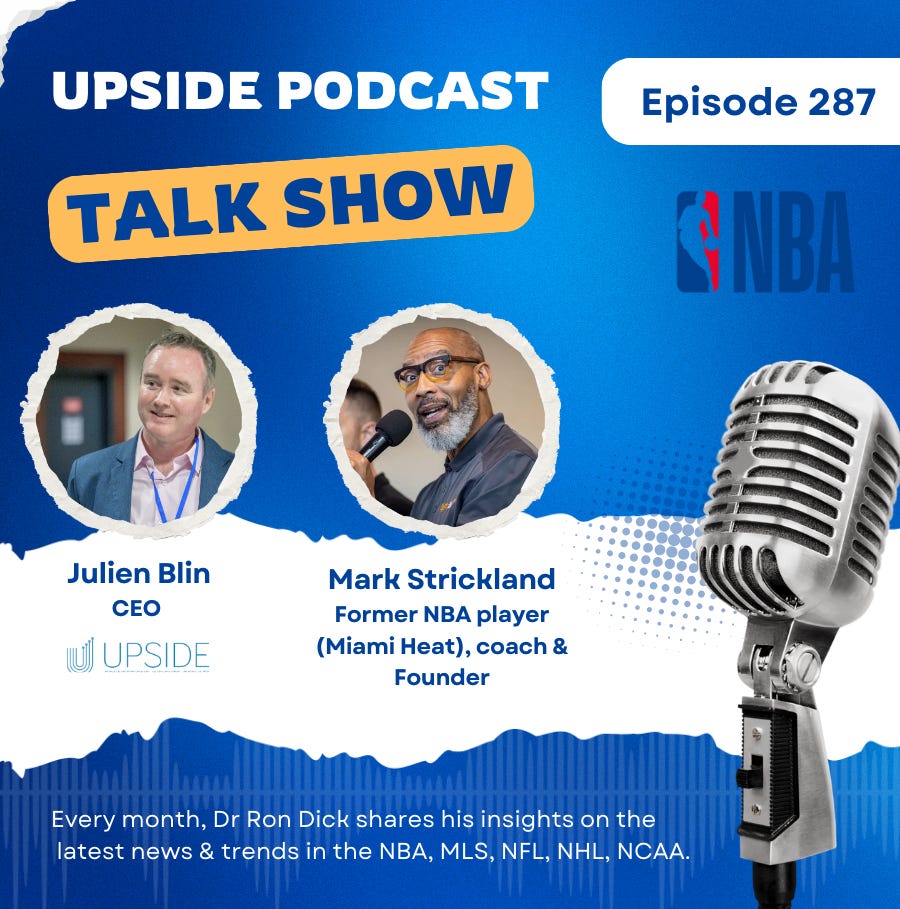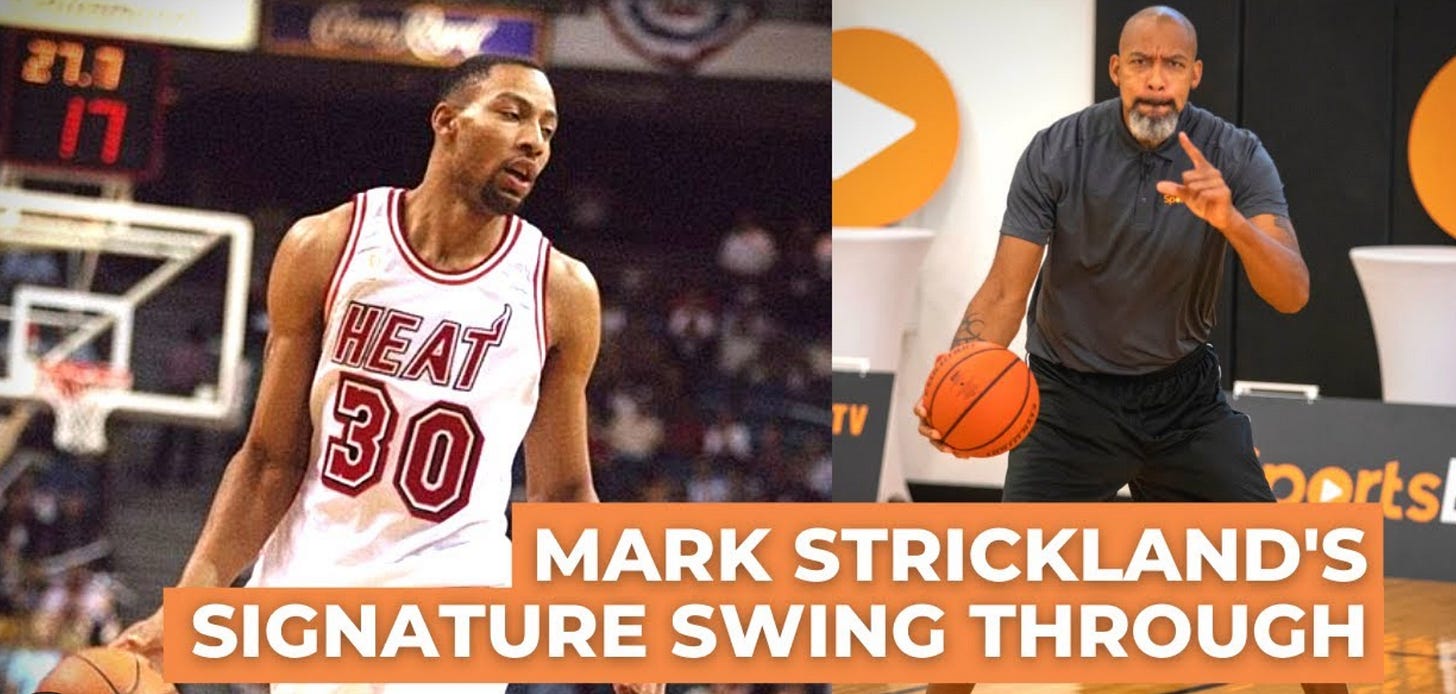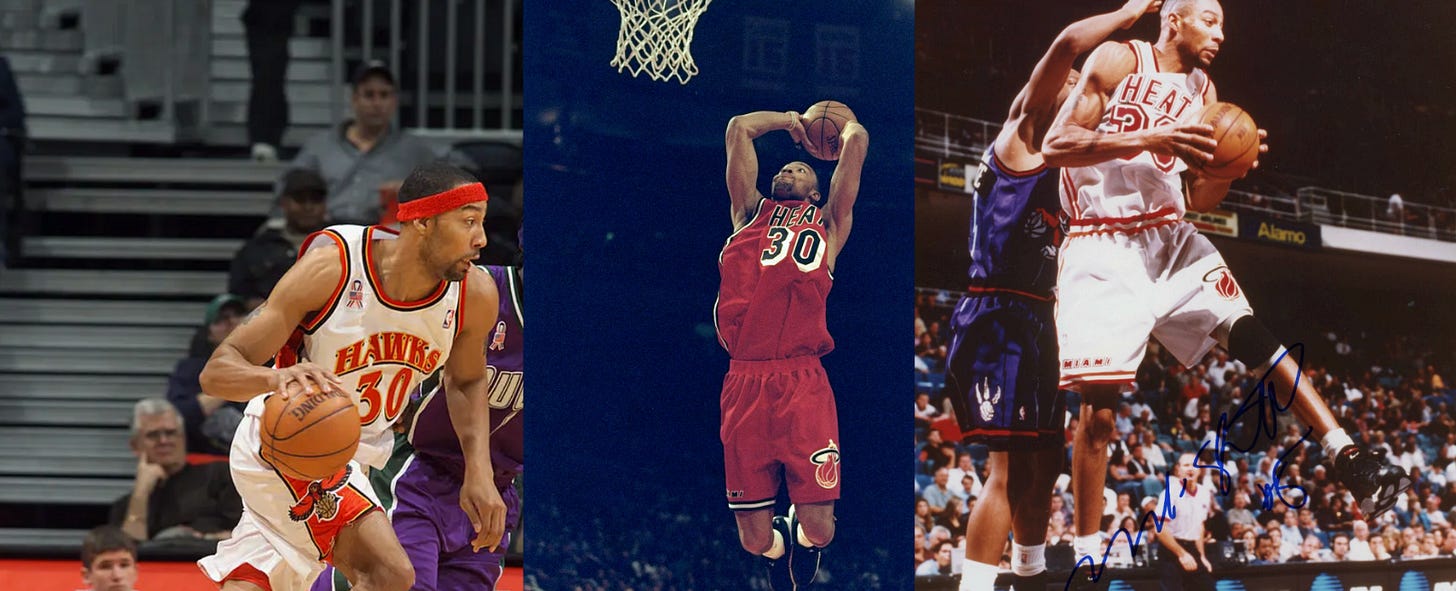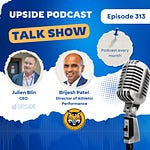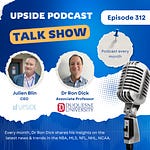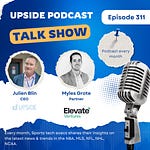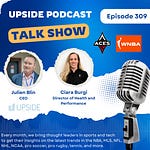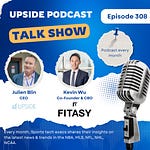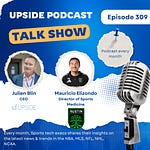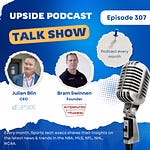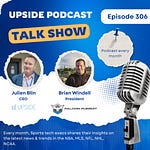Today we have the honor of interviewing Mark Strickland, a former NBA player who played for the Miami Heat, Brooklyn nets and now is a coach and founder of Pogoman’s Pop-Up Clinics.
Mark Strickland, known as “Pogoman,” is a former American professional basketball player who spent ten seasons in the NBA, most notably with the Miami Heat, and also played for the Denver Nuggets, New Jersey Nets, Sacramento Kings, Atlanta Hawks, Indiana Pacers, and Dallas Mavericks. Following his NBA career, Strickland continued to excel internationally, competing in professional leagues across China, Dubai, Jordan, Qatar, Lebanon, France, and Puerto Rico—where he led his team to a championship. Throughout his journey, he trained under legendary coaches such as Pat Riley, George Karl, Don Nelson, and Larry Brown, experiences that shaped his approach to coaching and player development at the high school, collegiate, and professional levels, including the NBA D-League.
Beyond the court, Mark has remained deeply engaged in community and advocacy work. As an active member of the National Basketball Retired Players Association (NBRPA), he spearheaded the partnership between the NBRPA and the Cancer Treatment Centers of America to promote prostate cancer awareness and early detection. Together with his wife, Tomi, he also co-founded The Ara Initiative, an organization dedicated to providing clean drinking water to children across the United States—reflecting his lifelong commitment to using his platform for impact and social good.
You can watch the video interview below by clicking on the Youtube link. You can also listen to the audio interview by clicking on the link at the top of the page:
📝Show Notes: During the interview with Mark, we discussed his journey from an undrafted player to a nine-year NBA career, highlighted by his four-year stretch with the Miami Heat where a one-day tryout turned permanent by outworking everyone in Pat Riley’s culture of accountability. He shared his transition to coaching, the entrepreneurial mindset he developed—that “it’s all mental” and “some nos are a blessing”—and leadership lessons learned from playing alongside greats like Reggie Miller and Alonzo Mourning.
Mark explained his current mission through the Pogoman Pop-Up Clinics, providing free basketball training to overlooked kids whose families can’t afford expensive AAU programs, and his future vision for the Pogoman Foundation built on three pillars: education (scholarships), sports (Pop-Up Clinics), and nutrition (partnering with Feeding South Florida to address food insecurity).
You can read the full transcript of the podcast interview with Mark located at the top of this blog post.
Here are the quotes from the interview with Mark:
Q1. NBA Career & Time with the Miami Heat
On Making the Team:
“Making the Miami Heat team was the highlight because I came down here on a one-day trial. One day turned into two days, two days turned into three days, and then they sent me home. So I thought it was over, but I didn’t know it was Labor Day weekend, so they didn’t want any players down here while everybody was gone for the three or four-day holiday. Then all of a sudden I got a call from my agent that Monday saying, ‘Hey, they want you back.’ And I’ve been here ever since. That was one of the biggest highlights—just the way I made the Miami Heat team, coming on a one-day trial and then spending four seasons there. Now I still live here and have businesses here.”
On Standing Out:
“I was trying to figure out ways to stand out because I was coming in at the bottom. I had a couple of free agents ahead of me, a guy that Pat Riley really loved and brought to camp every year, and I had a couple of draft picks as well in front of me. So I was maybe like five on the depth chart when I first got here. I was like, okay, what is it that I can do to stand out every day? So I knew nobody on that team was faster than me, nobody on that team could jump higher than me, and nobody was going to outwork me. Those are the things I brought to the table every day.”
On Competing in Everything:
“They were keeping charts on everything. The number of dunks in one minute—I got that record. The sprints that we did on the football field—I got that record. The 17 record—I think I had it for years until somebody else broke that record. I wanted to have my name on all of the records. You’re trying to figure out ways to stand out, so every drill I was trying to be first. Every time we had any type of challenge, I was trying to find ways to stand out so that I would always be seen.”
On Heat Culture:
“The Miami Heat has the best organization as far as being in shape, development, weight, and body fat. That’s why they call it the Heat culture—it’s different from everywhere else. They hold you accountable for everything: being on time, following a rule book about this thick with all the rules. You have to be very disciplined to play here. When you play for the Heat, because I was here so long, you kind of take those same characteristics and those initiatives and you put them towards your real life.”
Q2. The Transition from Player to Coach
On Learning from Pat Riley:
“Before I took the job in Oshawa, I had a meeting with Pat Riley. The great thing about the Heat organization is they’re always accessible to you, especially when you’re one of their players and I was here for a long time. I still have a relationship with him and I also do the Junior Heat basketball camps. I went to him and had a couple of meetings. He told me what to look for in the draft, what type of wings he looked for. He told me to look for long athletic wings, make sure I had a good center, make sure I had a good point guard. So I went off that formula.”
On Combining Different Philosophies:
“I took little bits and pieces from everybody. I picked little bits and pieces from Larry Brown, little bits and pieces from Coach Cheney, and a lot from Pat Riley. Because it was professional basketball, I knew he knew what to look for—what type of wings he looked for, making sure I had a good center and a good point guard.”
On Why He Moved to Training:
“It wasn’t that hard going into coaching, but it got kind of difficult once I got to the D-League—it’s the G-League now, but it was the D-League then. I just didn’t like how I was treated. I felt like as a former NBA player, I should have been treated a little bit differently up in Bakersfield. That’s what made me venture out into doing training, doing consulting work—like I do with Hoop Dreams where I help them out and do the mental part of the game as well as the conditioning. Now I’ve gotten into doing some development, which led me to doing the Pogoman Pop-Up Clinics.”
Q3. Entrepreneurial Mindset & Life Beyond the Court
On Mental Toughness:
“It’s all mental. All the coaches I played for, you have to be mentally tough. I kind of have tunnel vision when I want to do something—I don’t let outside things bother me. I focus in well on what I want to do, and I just keep going and keep plugging. The hard work, getting up early, being there first—if you own a business, I feel like you should be there first and you should be the last to leave because your workers see that example and they’ll follow suit. They’ll take on that same type of attitude.”
On Learning from Rejection:
“I did learn over the years that some nos are a blessing. Once I learned that, when I got a no from some people or was rejected by some people, or a company would say no and wasn’t interested, I wouldn’t take it personally. Because I know, okay, that might not be the situation for me—that might be a better situation. And nine times out of ten, more than likely that’s what happened. That company said no, but then later on, two or three months later, I meet with, say for instance, Coca-Cola Florida, and now they have a bigger budget and now I’m dealing with somebody on a much bigger scale that’s willing to help me and likes what I do.”
On Learning from Great Players:
“You learn leadership skills playing with guys like Reggie Miller, Alonzo Mourning, Mark Jackson, and Dale Davis. The list goes on. You study these guys, you see how they lead, how they get guys to follow them. So you take on those same skills with the students at the school, with the students that I have at the Hoop Dreams programs, and also with the Pogoman Pop-Up Clinics—the same type of dedication, same type of focus, letting these kids know that this is for development, getting you better. It’s all about getting better, and then the rest will kind of take care of itself.”
On Veterans Teaching the Culture:
“The first guy that taught me about being a professional, especially down here in Miami, was a guy by the name of Keith Askins, who works for the Heat now in the scouting department. He wasn’t a star player, but he was a leader. He was a guy that was always first, always last to leave the gym. He always had great advice for me, he worked hard every day, and he was always ready when his number was called on the bench. When you’re seeing that, you kind of take that same type of attitude and apply it to yourself, and the next thing you know, you’re having success as well.”
Q4. Current Youth Basketball Initiatives & Philosophy
On Making Training Free:
“I see all these trainers and all these people charging these kids, you know, and I know my parents didn’t have six, seven, eight hundred dollars a week for me to have coaches. They didn’t have it. All I did was go up and play ball on my own. So I figured out a way to play chess and not checkers, and I figured out how to get a lot of great sponsors and got some grants. I was able to get the money through these companies and through grants, and now I can have the kids come for free and they can get quality training for free. It’s the same concept as Day Prep Academy—we have two now, one in Cutler Bay, one in Florida City. We take the bottom 10% out of all public schools and we give them an opportunity to get their credits up and get their high school diploma. And it’s for free, through school choice vouchers and Step Up for Kids. Everything I try to do, I try to make it free for the kids so we can get as many kids as we can to come in and get that quality training.”
On Teaching Teamwork Over Individual Glory:
“I try to teach them how to work with others. It’s five guys out there—you have to work as one unit. I think these days with AAU and social media, everybody wants clicks and everybody wants a highlight reel, individual play. But for me it’s more about if you can play well with others. A lot of the great players—Magic Johnson, Michael Jordan when he got Phil Jackson—started trusting other teammates. You can even see it in his documentary, The Last Dance. When he first got in the league, it was all one-on-one, Michael, Michael, Michael. Phil Jackson was like, ‘Hey, you have to—defense is easy for the defense to guard that. We’ve got to get the ball moving a little bit more. We’ve got all these other players that have different talents that can help make the game easier for you.’ So I try to teach that.”
On Life Skills Beyond Basketball:
“I try to teach them to work hard—you have to work hard at everything you do. And I try to teach them how to work well with others because you’re going to have to do it on a job. You’re going to have to do it if you own a business—you’re going to have to be able to work with other people. If you get a group of people that work well together, you’re going to have a stronger foundation than just having one person being that guy.”
On Being Honest and Realistic:
“I’m very honest with them. At least I tell them, if you’re going to go out and try to play ball, at least try to be some type of important piece to your team. If you can’t score, you can always get rebounds, you can always play defense, you can always be a good screener, you can always run the floor to get easy baskets for your team. There are other things that you can do. I get a lot of players that just want to make their high school team, just to have that memory and be a part of a team some kind of way. So I tell them, ‘Hey, this is what you do well. Try to do this, but also work on your other things. Work on other things, but these are the things you do well, so you need to do these things every day consistently. The coach needs to see you doing this every day, and trust me, he’ll see you getting better at the other things.’”
On Working with Overlooked Players:
“Most of those younger players are already on AAU teams—their path is already kind of set. But there’s a group of kids out there that are maybe not that good, or maybe not there yet, but people give up on them. So now what do you do? I’ll be like, ‘Hey, come over here, we’ll teach you some skills. We’ll get you better. I’ll see what you can do. We’ll work on that, but also work on these things so that you can be a well-rounded player, and then you can at least help a team with the team you’re trying to make.’ That’s why I do what I do. Because most of those younger players are already on AAU teams, but I work with the kids that people have given up on.”
Q5. Sports Management Background and Future Goals
On His Three-Pillar Mission:
“What I’m doing now and in the future is building the Pogoman LLC. I have the 501(c)(3) Pogoman Foundation, and what we’re going to do is cover three areas. Education—we’re going to start giving out scholarships to unfortunate kids that have straight A’s at Day Prep. Since I’m a part of Day Prep, I’m going to give a portion of money to give out free scholarships for kids to go to Daye College. That’s the education piece. The sports piece will be the Pop-Up Clinics. And then I’m going to eventually start working with Feeding South Florida—that’ll be the nutrition piece. As you know, groceries are crazy these days. There’s an organization down here in Florida that gives out free groceries to people. I saw something on the news where they’re looking for people to donate and give back and make it easier for them to get the food in for free. So my mission is to do education through giving kids scholarships, sports through the Pogoman Pop-Up Clinics, and nutrition through Feeding South Florida.”
On Sports as a Lifelong Habit:
“Once you play sports, you don’t forget it. I can’t go a day without working out. The leadership skills I got from other people, I try to hand that down to a lot of the younger coaches. I have younger coaches that work with me at Hoop Dreams—I give them advice. I do the same with the people that come with me to the Pogoman Pop-Up Clinics. I give that same advice.”
You may also like:


